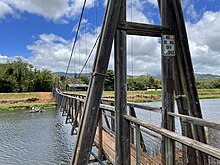Hanapepe Valley
History

Hanapepe was one of the locations visited by the United States Exploring Expedition under Charles Wilkes; the expedition arrived in Hawaii in late September 1840 and spent some time in the islands.
It is one of the few towns on the island that was not created by the sugarcane plantations. In 1924, an armed labor dispute involving sugar workers occurred, ending in the Hanapepe massacre.
Geography
Hanapepe is located on the southern side of the island of Kauai. It is bordered to the east, across the Hanapēpē River and Hanapepe Bay, by the community of Eleele. Hawaii Route 50 passes through the southern part of Hanapepe, leading east 17 miles (27 km) to Lihue and northwest 6 miles (10 km) to Waimea.

For statistical purposes, the United States Census Bureau has defined Hanapepe as a census-designated place (CDP). The census definition of the area may not precisely correspond to local understanding of the area with the same name. The Hanapepe CDP has a total area of 1.0 square mile (2.6 km), of which 0.93 square miles (2.4 km) are land, and 0.1 square miles (0.2 km), or 9.43%, are water.

Demographics
| Census | Pop. | Note | %± |
|---|---|---|---|
| 2020 | 2,678 | — | |
| U.S. Decennial Census | |||
As of the census of 2000, there were 2,153 people, 706 households, and 533 families residing in the CDP. The population density was 2,469.8 inhabitants per square mile (953.6/km). There were 757 housing units at an average density of 868.4 per square mile (335.3/km). The racial makeup of the CDP was 16.0% White, 0.1% African American, 0.3% Native American, 48.6% Asian, 8.5% Pacific Islander, 0.2% from other races, and 26.3% from two or more races. Hispanic or Latino of any race were 8.6% of the population.
There were 706 households, out of which 41.8% had children under the age of 18 living with them, 57.2% were married couples living together, 12.3% had a female householder with no husband present, and 24.4% were non-families. 19.8% of all households were made up of individuals, and 8.6% had someone living alone who was 65 years of age or older. The average household size was 3.05 and the average family size was 3.54.
In the CDP the population was spread out, with 32.0% under the age of 18, 6.5% from 18 to 24, 29.4% from 25 to 44, 20.1% from 45 to 64, and 12.1% who were 65 years of age or older. The median age was 35 years. For every 100 females, there were 103.3 males. For every 100 females age 18 and over, there were 98.9 males.
The median income for a household in the CDP was $44,112, and the median income for a family was $50,750. Males had a median income of $30,039 versus $24,224 for females. The per capita income for the CDP was $17,043. About 5.8% of families and 6.6% of the population were below the poverty line, including 7.7% of those under age 18 and 10.8% of those age 65 or over.
Economy
The main street has plantation-style buildings built in the 1930s and ’40s that house art galleries, eateries and boutiques. Hanapepe is the headquarters location for the ice cream company Lappert's Hawaii, as well as home to the westernmost bookstore in the United States, The Bookstore - Talk Story.
In popular culture
The town was the inspiration for Kokaua Town, the fictional hometown of the main characters in the Disney animated film Lilo & Stitch and its related franchise (the town was not named until Lilo & Stitch: The Series).
All of the Queensland scenes in 1983's The Thorn Birds were filmed in Kauai, with several of the scenes being shot in Hanapepe.
Hanapepe was the filming location for the Filipino city of Olongapo in Flight of the Intruder.
On August 27, 1980, Douglas Kenney, a co-writer of the film National Lampoon's Animal House, fell 30 feet (9.1 m) to his death from the Hanapepe Lookout.
References
- ^ Hammon, Dawn (July 9, 2024). "Hawaii's 'Biggest Little Town' Is A Wildly Underrated Area Full Of Unique Food And Shops". Islands. Retrieved July 11, 2024.
- ^ "2020 U.S. Gazetteer Files". United States Census Bureau. Retrieved December 18, 2021.
- ^ Pukui, Mary Kawena (1974). Place Names of Hawaii. University of Hawaii Press. ISBN 0-8248-0524-0.
- ^ University of Hawaii. "Wehewehe". Double click on pēpē, and then doubleclick on pē.pē. University of Hawaii. Retrieved November 15, 2016.
- ^ "Geographic Identifiers: 2010 Demographic Profile Data (G001): Hanapepe CDP, Hawaii". U.S. Census Bureau, American Factfinder. Retrieved January 31, 2019.
- ^ "Census of Population and Housing". Census.gov. Retrieved June 4, 2016.
- ^ "U.S. Census website". United States Census Bureau. Retrieved January 31, 2008.
- ^ Fox, Catherine Toth (December 11, 2020). "Your Walking Guide to Hanapēpē, Kauaʻi". Hawaii Magazine. Retrieved August 28, 2021.
- ^ Kauai (Lonely Planet Regional Guide), by Luci Yamamoto & Amanda C. Gregg, October 1, 2009, ISBN 978-1-74104-136-1
- ^ Warner, Gary A. (April 26, 2009). "Lilo and Stitch are alive and well in Hanapepe, Hawaii". The San Diego Union-Tribune.
- ^ "Location Guide to Movies Filmed on Kauai". September 2016.
- ^ https://archives.starbulletin.com/2005/11/27/travel/tsutsumi.html
